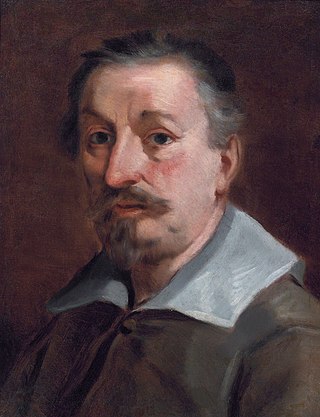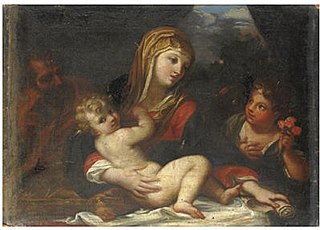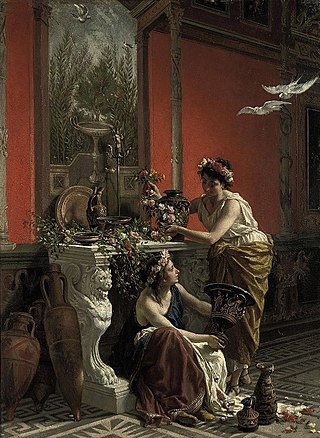
Niccolò Berrettoni (15 December 1637 – February 1682) was an Italian painter of the Baroque period.

Niccolò Berrettoni (15 December 1637 – February 1682) was an Italian painter of the Baroque period.
He was born in Macerata Feltria on December 14. 1637. As a child he studied under Simone Cantarini in Pesaro; at the death of this master, he moved circa 1670 to Rome to work for the large studio of Carlo Maratta. In 1675, while still in the orbit of Carlo Maratta, he entered as an academic into the Roman painter's guild, the Accademia di San Luca. Under the patronage of Maratta, he obtained important commissions; however, in the last years of his life, his relationship with this master altered. According to Pascoli, in 1680 when Berrettoni was about to receive the commission of the ceiling fresco of the nave of San Silvestro in Capite, Maratta, fearing the rising fame of his pupil, caused the commission to be assigned instead to the older Giacinto Brandi. Embittered by the affair, Pascoli said Berrettoni fell ill, and died in February 1682. [1]
Some of Berrettoni's painting executed for aristocratic clients, including the Flight to Egypt (mentioned in an estimate of 1724 and cited by Pascoli) are missing. Works ascribed to Berrettoni include:

Pinturicchio, or Pintoricchio, also known as Benetto di Biagio or Sordicchio, was an Italian Renaissance painter. He acquired his nickname because of his small stature and he used it to sign some of his artworks that were created during the fifteenth and sixteenth centuries.

Francesco Albani or Albano was an Italian Baroque painter of Albanian origin who was active in Bologna, Rome, Viterbo (1609–1610), Mantua (1621–1622) and Florence (1633).

Carlo Maratta or Maratti was an Italian painter, active mostly in Rome, and known principally for his classicizing paintings executed in a Late Baroque Classical manner. Although he is part of the classical tradition stemming from Raphael, he was not exempt from the influence of Baroque painting and particularly in his use of colour. His contemporary and friend, Giovanni Bellori, wrote an early biography on Maratta.

Santa Maria dei Miracoli and Santa Maria di Montesanto are two churches in Rome.

Stefano Pozzi was an Italian painter, designer, draughtsman, and decorator whose career was spent largely in Rome.

Gregorio de Ferrari was an Italian Baroque painter of the Genoese School.

Francesco Cozza was an Italian painter of the Baroque period.

Domenico Maria Canuti was an Italian painter of the Baroque period, active mainly in Bologna and Rome. He was a major painter of fresco decorations. His ceiling decorations showed a mix of Bolognese and Roman influences.

Francesco Trevisani was an Italian painter, active in the period called either early Rococo or late Baroque (barochetto).

Giacinto Calandrucci was an Italian painter of the Baroque period.

Giuseppe Bartolomeo Chiari, also known simply as Giuseppe Chiari, was an Italian painter of the late-Baroque period, active mostly in Rome.

Giovanni da San Giovanni, also known as Giovanni Mannozzi, was an Italian painter of the early Baroque period, active in Florence.

Giacinto Gimignani was an Italian painter, active mainly in Rome, during the Baroque period. He was also an engraver of aquaforte.

Luigi Garzi (1638–1721) was an Italian painter of the Baroque period whose style was strongly influenced by the work of the Bolognese painter Guido Reni.

Cesare Mariani was an Italian painter and architect of the late-19th century, active in Rome and Ascoli Piceno.
Lorenzo De Ferrari was an Italian painter of the Baroque period, active mainly in his native city of Genoa.

Niccolò Bambini (1651–1736) was an Italian painter of the late-Renaissance and early-Baroque periods.
Giovanni Girolamo Frezza (1659–1730) was an Italian engraver. He was born in Canemorto (Orvinio), near Tivoli, and died in Rome. He was instructed in engraving in Rome by Arnold van Westerhout.

Francesco Mancini was an Italian painter whose works are known between 1719 and 1756. He was the pupil of Carlo Cignani.

Fabrizio Chiari (c.1615–1695) was an Italian painter and engraver who spent his entire life in Rome.